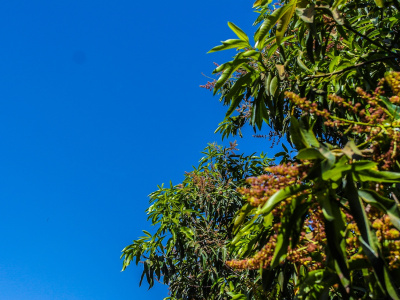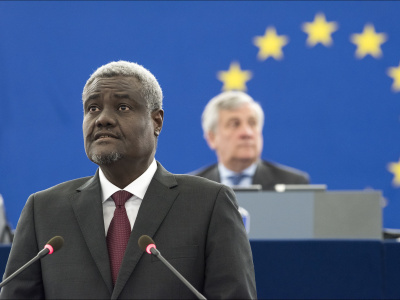
Technology to empower society: The BarefootLaw experience
A new generation of young African entrepreneurs are taking on the major challenges in their society, using technology and innovative thinking applied to their local context. They are providing a potential blueprint for solving other problems across the continent. In this regard the Partnership between the African Union and the European Union could play an important role if the available instruments were more flexible to reach out to these younger generations.
Innovation in a global context
In most cases, the word innovation or indeed the words ‘innovation’ and ‘technology’, immediately evoke an image of cutting edge devices, systems or applications, developed from the fast-paced Silicon Valley in the US, or other technology leading spaces across the globe. It could be the latest breakthrough in augmented reality technology helping nearly half a billion people to play a game, such as Nintendo’s PokemonGo!, or the rapid mainstreaming of market-changing applications that are turning traditional businesses on their heads, such as Uber or AirBnB, where from having to stand out on the street to hail a taxi, one is now able to order a ride and split the bill, while still at the dinner table with friends. In this context, innovation often challenges a market that is already well structured where the new utility is an improvement on an already existing one. In fact, many of these innovations are based on the best and latest technology available. Most importantly, when these innovations occur, they almost always need to become global successes to be considered truly ‘world changing’. It is only when you use Uber both in New York and in Kampala, that you grasp the level of impact.
The reality is that this context represents a fairly accurate depiction of what innovation is globally today. Innovation is big, it is bold, it is cutting edge and it is leading from the front.
Innovation in the African space
However this is not the full picture. This is only what I would call a ‘mainstream’ context of innovation as opposed to a ‘global’ context. Take for example, the financial technology (FinTech) space. Great big leaps on FinTech have come out of Africa, most notably, the emergence and rapid growth of the use of mobile money services.
In Kenya, Safaricom’s M-Pesa mobile money service, which enables the telecom network’s subscriber to transfer money, pay for services and even take micro loans, has rapidly changed the way the money and finance is accessed in Kenya. The same applies in other African countries where mobile money is used. With little more than a 15 Euro feature phone and a GSM connection, users are accessing and using money in previously unthought-of ways.
From an initial basic service that allowed two people to transfer as little as 0.4 euro (50 Kenya shillings) via their mobile phones, M-Pesa has now more than 26 million users with over 55.9m euro worth of transactions in 2017. The M-Pesa revolution has set in motion several other innovations, providing service vendors an avenue to collect revenue and a platform on which other service apps can be built to serve the public. Many of these other innovations are run by youthful, energetic Africans who are taking the opportunity to develop solutions for their communities.
What this demonstrates is that innovation can come from anywhere, and still be ‘world changing’; it can provide a new and better experience for people, whether it is a new gaming experience or a breakthrough in microfinance that uplifts small scale farmers in rural communities with small loans.
Innovation and technology, the BarefootLaw story
This is where the BarefootLaw story comes in. BarefootLaw was established in 2013 in Uganda as an organisation working in the legal sector on improving access to justice.
It all started from a very modest idea. When I was a student in law school, I started noticing the huge gap in the knowledge of the law and how this gap affected people’s daily lives. It might be a person being held in police custody without knowledge of his or her rights, or people taking justice in their own hands because of lack of trust in the judicial process. It became clear that there was a need to provide this information to the public, to empower people to make better decisions and, ultimately, apply true justice and the rule of law.
BarefootLaw started with a used 3G iPhone, by providing legal information to the public on a Facebook page. Initially, only a few people checked it, inquiring on different sections of the law (to be honest, most of them were law students at my law school and friends). This was hardly an innovation at the time. Facebook had already become a global phenomenon, and pages were being used for everything from news and entertainment to selling products.
However, the demand for this service grew incredibly fast and it was not before long that people started asking for legal support on how to undertake court procedures as they had no money for a lawyer. Indeed, within a short period of time, we were also faced with a challenge to provide this service to those with basic feature phones. We had to expand our work to provide this information on other platforms like SMS (short messaging services), websites, and even using traditional methods of legal aid such as going out into communities.
This was driven by the realisation that for most of Africa, technology does not operate in a vacuum, and services based on new technology such as mobile phones were merely complementing already existing systems and services, simply making them more efficient. It seems that our rapid growth was the result of a big gap in access to legal services in the country. BarefootLaw quickly realised that with such a great need for legal support, there was a need to innovate to bring these services to more people.
Five years on, BarefootLaw provides free legal support to more than 450,000 people every month across all our platforms. In the near future we expect to improve the technologies we use to become even more efficient in providing this service and to expand across borders.
Innovation can also come from unusual locations, using simple technologies. Couple this with youthful energy and beliefs, critical insight on problems and local contexts, then you will see emerging very useful ideas with the potential of being replicated across countries and regions. BarefootLaw is one such example.
More than just a one off
We are only one of several examples of youthful innovations tackling real and present problems in their societies with innovative ideas and making use of technology for greater impact. In Kenya, Kytabu are providing an enriched learning experience by making curriculum content available on mobile devices, creating opportunities for students and teachers alike. In Ghana, Farmerline uses mobile technology to provide market-driven solutions to over 200,000 farmers to improve their access to markets, inputs and information. And these are just a few examples. While the impact of our organisation (and many others across the continent) might not yet be described as ‘world changing’, the numbers indicate that we are having a real impact on individuals and communities and, more importantly, we are doing so in a unique way.
These innovative initiatives are filling a gap that should be filled by proper working governance or market systems. Not only they help to solve specific social needs; they also allow us to learn a lesson on identification of the market and on usage and context of resources.
What more can be done and who can take part
And yet, this is only the beginning. At BarefootLaw for example, we are exploring automation and machine learning for some of our services. There is a lot to learn, and this is where the cutting edge/ leading edge technology spaces worldwide should work together to create useful knowledge exchanges. For many others, attracting the right kind of capital to support their growth is crucial. While venture capital has increased across the continent, there is still a big need for long term capital, as the space within which many of these entities operate is not yet well defined, and a lot of learning needs to happen.
There is also a need to partner with different entities and institutions – such as the European Union – with a global footprint to help jumpstart the scaling across borders. Therefore, more international organisations with interest in bringing socio-economic change ought to look into how to partner with innovation on the continent and the ways their work can be extended.
There is a need for the governments in Africa to set priorities and create enabling environments for innovations to prosper. This could be through the establishment of youth innovation grants, or the provision of subsidies to youth innovators on the continent.
If the innovation that is happening in Africa can be fostered – through partnership and support, it would empower and encourage young entrepreneurs to challenge the current status of their communities and bring change through entrepreneurship and innovation.
This is why innovation and technology in Africa will play a big role in achieving the Sustainable Development Goals (SDGs) and in doing so, contributing to building a prosperous continent for generations to come.
About the author
Gerald Abila is the founder of BarefootLaw.
Read the full magazine issue








